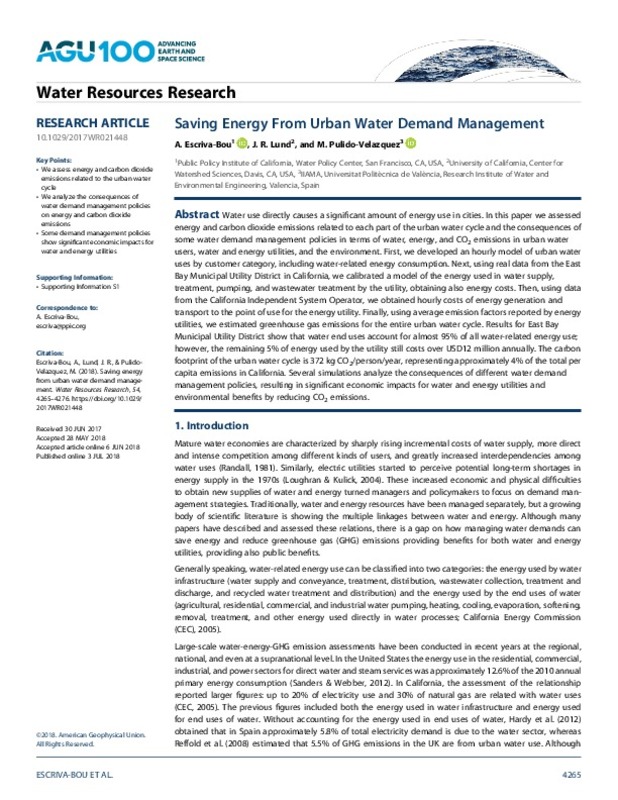JavaScript is disabled for your browser. Some features of this site may not work without it.
Buscar en RiuNet
Listar
Mi cuenta
Estadísticas
Ayuda RiuNet
Admin. UPV
Saving energy from urban water demand management
Mostrar el registro sencillo del ítem
Ficheros en el ítem
| dc.contributor.author | Escrivà Bou, Àlvar
|
es_ES |
| dc.contributor.author | Lund, JR.
|
es_ES |
| dc.contributor.author | Pulido-Velazquez, M.
|
es_ES |
| dc.date.accessioned | 2018-12-19T21:06:26Z | |
| dc.date.available | 2018-12-19T21:06:26Z | |
| dc.date.issued | 2018 | es_ES |
| dc.identifier.issn | 0043-1397 | es_ES |
| dc.identifier.uri | http://hdl.handle.net/10251/114251 | |
| dc.description | This is the peer reviewed version of the following article: Escrivà Bou, Àlvar, Lund, JR., Pulido-Velazquez, M.. (2018). Saving energy from urban water demand management.Water Resources Research, 54, 7, 4265-4276. DOI: 10.1029/2017WR021448, which has been published in final form at http://doi.org/10.1029/2017WR021448. This article may be used for non-commercial purposes in accordance with Wiley Terms and Conditions for Self-Archiving. | |
| dc.description.abstract | [EN] Water use directly causes a significant amount of energy use in cities. In this paper we assessed energy and carbon dioxide emissions related to each part of the urban water cycle and the consequences of some water demand management policies in terms of water, energy, and CO2 emissions in urban water users, water and energy utilities, and the environment. First, we developed an hourly model of urban water uses by customer category, including water-related energy consumption. Next, using real data from the East Bay Municipal Utility District in California, we calibrated a model of the energy used in water supply, treatment, pumping, and wastewater treatment by the utility, obtaining also energy costs. Then, using data from the California Independent System Operator, we obtained hourly costs of energy generation and transport to the point of use for the energy utility. Finally, using average emission factors reported by energy utilities, we estimated greenhouse gas emissions for the entire urban water cycle. Results for East Bay Municipal Utility District show that water end uses account for almost 95% of all water-related energy use; however, the remaining 5% of energy used by the utility still costs over USD12 million annually. The carbon footprint of the urban water cycle is 372 kg CO2/person/year, representing approximately 4% of the total per capita emissions in California. Several simulations analyze the consequences of different water demand management policies, resulting in significant economic impacts for water and energy utilities and environmental benefits by reducing CO2 emissions. | es_ES |
| dc.description.sponsorship | This paper has been developed as a result of a mobility stay funded by the Erasmus Mundus Programme of the European Commission under the Transatlantic Partnership for Excellence in Engineering-TEE Project. This research was also partially supported by the IMPADAPT project (CGL2013-48424-C2-1-R and CGL2013-48424-C2-2-R) of the National Research Plan (Plan Estatal I+D+I 2013-2016), funded by the Spanish Ministry MINECO (Ministerio de Economia y Competitividad) and European Federation funds. Water and energy microdata were kindly provided by Frank Loge and Edward Spang, at the Center for Water and Energy Efficiency of the University of California, Davis, who are able to release the data under private agreements and to whom we are very grateful. The results can be totally reproduced using the summary tables included in the supporting information.c | |
| dc.language | Inglés | es_ES |
| dc.publisher | John Wiley & Sons | es_ES |
| dc.relation.ispartof | Water Resources Research | es_ES |
| dc.rights | Reserva de todos los derechos | es_ES |
| dc.subject.classification | INGENIERIA HIDRAULICA | es_ES |
| dc.title | Saving energy from urban water demand management | es_ES |
| dc.type | Artículo | es_ES |
| dc.identifier.doi | 10.1029/2017WR021448 | es_ES |
| dc.relation.projectID | info:eu-repo/grantAgreement/MINECO//CGL2013-48424-C2-1-R/ES/ADAPTACION AL CAMBIO GLOBAL EN SISTEMAS DE RECURSOS HIDRICOS/ | es_ES |
| dc.rights.accessRights | Abierto | es_ES |
| dc.date.embargoEndDate | 2019-01-01 | es_ES |
| dc.contributor.affiliation | Universitat Politècnica de València. Departamento de Ingeniería Hidráulica y Medio Ambiente - Departament d'Enginyeria Hidràulica i Medi Ambient | es_ES |
| dc.description.bibliographicCitation | Escrivà Bou, À.; Lund, J.; Pulido-Velazquez, M. (2018). Saving energy from urban water demand management. Water Resources Research. 54(7):4265-4276. https://doi.org/10.1029/2017WR021448 | es_ES |
| dc.description.accrualMethod | S | es_ES |
| dc.relation.publisherversion | http://doi.org/10.1029/2017WR021448 | es_ES |
| dc.description.upvformatpinicio | 4265 | es_ES |
| dc.description.upvformatpfin | 4276 | es_ES |
| dc.type.version | info:eu-repo/semantics/publishedVersion | es_ES |
| dc.description.volume | 54 | es_ES |
| dc.description.issue | 7 | es_ES |
| dc.relation.pasarela | S\367470 | es_ES |
| dc.contributor.funder | Ministerio de Economía, Industria y Competitividad | es_ES |








